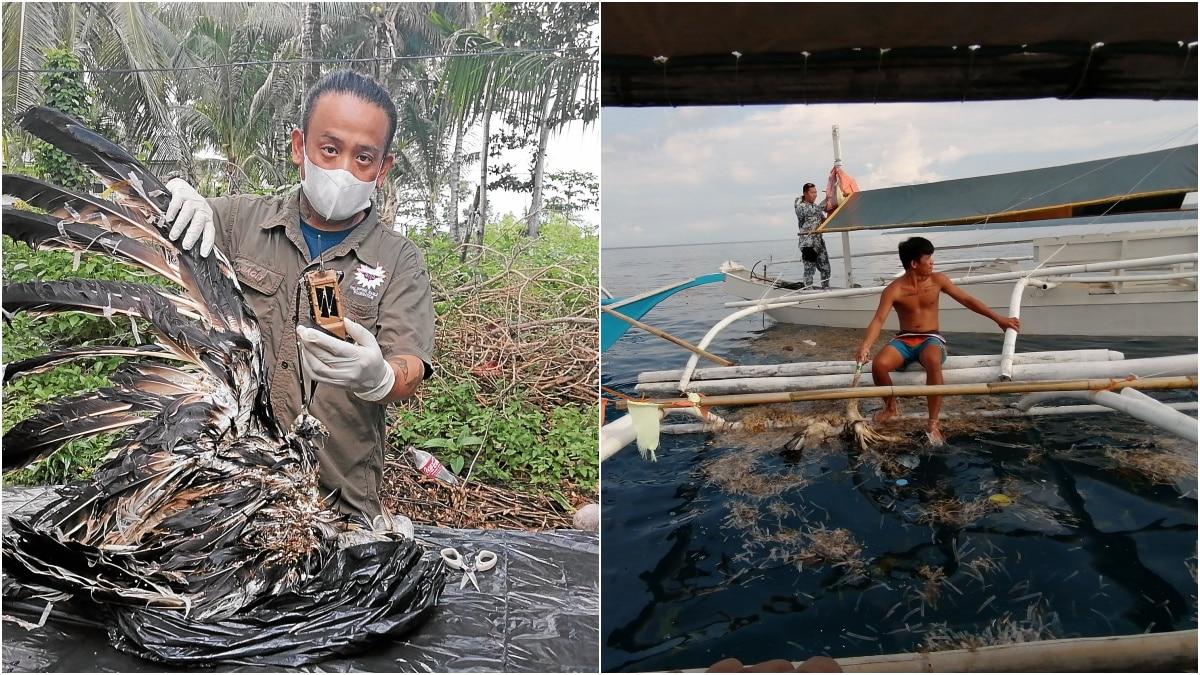
SEARCH OVER Philippine Eagle Foundation (PEF) senior biologist Rowell Ron Taraya checks on “Uswag’s” solar-powered transmitter, which is key in locating where the eagle crashed and was recovered on Saturday in the waters off Pilar town on Camotes Islands, Cebu, by Philippine Coast Guard and PEF personnel, and volunteers. —PHOTOS BY JOSELLE R. BADILLA
CAMOTES ISLANDS, CEBU—One month after his release into a new home in the forests of Burauen, Leyte, 3-year-old “Uswag,” a male juvenile Philippine eagle (Pithecophaga jefferyi), was found dead off the coasts of Pilar town on the Camotes Group of Islands in Cebu on Saturday.
Uswag was floating among some sea debris when found at 3:30 p.m. in an area where two different sea currents meet, known to locals as “samo,” about 540 meters from the coasts of Barangay Cawit.
The eagle’s demise has set back the initial gains of the ambitious program to reintroduce the critically endangered national birds in Eastern Visayas after their population was wiped out by Supertyphoon “Yolanda” (international name: Haiyan) in 2013.
READ: Philippine eagle killed in Davao de Oro
Along with female raptor “Carlito,” Uswag was released to the wild last June 28, the first eagle pair to be translocated from Mindanao, where both of them were rescued from the hands of wildlife poachers.
The eagle reintroduction program by the Philippine Eagle Foundation (PEF) and the Department of Environment and Natural Resources sought to repopulate the raptors in Leyte after nesting sites were destroyed by Yolanda, the world’s fiercest storm.
READ: Planting for the future of the Philippine eagle
An eagle pair was last seen in Leyte in 2007, and a lonesome raptor in 2013, just before Yolanda’s fury. There are currently 392 pairs of Philippine eagles remaining in the country’s wilds, according to current estimates.
Before the July 30 accident, when Uswag was still monitored in the forests, field observations “suggested that he was actively hunting after he was released,” said Dr. Jayson Ibañez, PEF operations director.
Transmitter tracking
Ibañez said Uswag could have crashed into the sea and then drowned. He was last monitored through a solar-powered transmitter strapped on his body to be already at sea near midnight of July 30.
Before this, his last monitored location was on July 9, on the western slopes of the Mt. Pangasugan range in Baybay City, Leyte, about 5.98 kilometers from his July 30 location.
With the help of the Baybay City local government, Community Environment and Natural Resources Office, and the Philippine Coast Guard (PCG), search and retrieval operations began on Aug. 1, guided by the coordinates sent by the transmitter on Uswag’s body.
The following day, a new batch of coordinates indicated Uswag was already along the coast between Poro and Ponson Islands, within the vicinity of Camotes, hence the need to enlist the help of the PCG and local authorities in Pilar town, who were joined by Cawit fishermen.
Petty Officer 2 Amando Iturriaga Jr., PCG station commander in northern Pilar, employed four pumpboats to widen the search on Saturday. By midafternoon, after a three-day search in a 78.5-square-km area between Camotes and Leyte, volunteer fisherman Mark Bryan Colmenas retrieved Uswag’s decomposing carcass.
Uswag was washed away 33 km from where he was thought to have crashed off Baybay City, some 102 km from where he was released in Barangay Kagbana, Burauen.
Puzzling incidents
“It’s a very sad event for everyone involved with this initiative, particularly our team who took care of this eagle and followed it after their release in Burauen. But our natural environment is truly unpredictable,” said PEF executive director Dennis Salvador.
“This phenomenon has puzzled us for many years now. It is pushing us to invest in studying this further and examine its role in extirpating populations in small islands and coastal forests,” Salvador added.
Dr. Marjorie Cortes, a veterinarian at Visayas State University where the eagle’s carcass was brought for necropsy, estimated that the raptor could have died at least four days before he was retrieved from the waters.
An X-ray examination done at Baybay Pet Lover’s Clinic on Sunday showed “all the bones of the body [of Uswag] were intact and had no signs of fracture [or] trauma.”
“No evidence of bullets or air gun pellets were also found in the X-ray. The veterinarians’ overall impression is that there was no anomaly evident in the bird’s carcass,” Ibañez said in his report to Environment Secretary Maria Antonia Yulo-Loyzaga.
Ibañez said that since 1984, Uswag was the ninth eagle recorded to have crashed into a body of water, seven of which were saved by fishermen. All eight incidents happened in Mindanao, the last one in 2022 in Maasim, Sarangani, in which the raptor drowned.
“We think that in all of these cases, the eagles reached the seas by accident. And that these misnavigations were influenced together by air and wind patterns and the location of the eagles’ habitat relative to coastal areas,” Ibañez explained.
Immature eagles, which are 2 to 6 years old, fly long distances during their dispersal stage and “are very vulnerable to sea mishaps,” he added. INQ